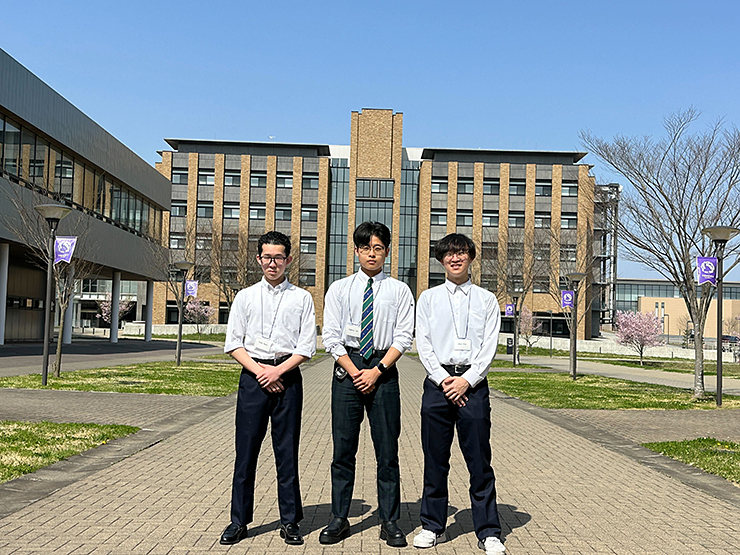「東北大学 × UCL Students Workshop」秀光コース2・3年生計3名が参加しました
社会課題の解決策について議論し、
プレゼンテーションを行いました
生徒の振り返り-01
社会イノベーションと地球規模の課題に関する東北大学とUniversity of College London(UCL)共催の国際ワークショップに参加する機会を得ました。国際バカロレア・ディプロマ・プログラム(IBDP)で学ぶ日本に留学中の高校生として、両校の学部・大学院生、そして教授の先生方と交流することができました。
ワークショップでは、地球規模の複雑な課題を解決するために協働的な問題解決方法、特に社会課題に立ち向かう際のイノベーションとレジリエンス(回復力)に重点が置かれました。さらに、このイベントでは持続可能な開発へのグローバルなアプローチについても議論しました。
UCLの学生の方はグローバルヘルスに関する取り組み、東北大学の研究者の方は災害後のコミュニティのレジリエンスに関する研究を共有して頂きました。高校からの日本留学の前には、中国のインターナショナルスクールに通っていた韓国人として、私は自身の国際経験を活かし、東北地方における組織運営と異文化協働に関して、東北地方全域の再活性化を目指す包括的なアウトリーチ・プログラムを提案しました。まずは仙台で国内外の多様な参加者を募集し、その後、青森・秋田・岩手県など各県にチームを派遣して地域固有の課題や文化交流をテーマとしたワークショップを実施する計画です。地域住民からの意見を集めた上で仙台に再集結し、得られた知見を統合して地方自治体向けの具体的な政策提言をまとめます。本プログラムは、宮城県に限らず東北全域でバランスの取れた発展を促進することを目的としています。これらの議論を通して、多様な視点が現実世界の課題に対する革新的な対応策につながるという理解が深まりました。
さまざまな学術的・文化的背景を持つ参加者により、多様な視点からの議論やグループ活動、そして創造的な解決策を考えることが実現しました。私は日本とイギリス出身の方と一緒の多文化のチームに所属し、英語と日本語を駆使してコミュニケーションを促進することができました。議論のなかで重要なポイントを要約し、翻訳する能力を発揮することで、私たちのグループはセッションを通して明確で効果的な対話を維持することができました。ワークショップで最も重要だった点の一つは、視点を明確にし、アイデアを統合して一貫した提案を作成することでした。私は積極的に傾聴し、明確な質問をし、チーム内の相互理解を深めるために要約を提供することに努めました。特に、UCLが実践していた「定期的なコミュニティ調査と継続的な対話」というコミュニケーションモデルに強く影響を受けました。例えば、あるUCLのチームでは、環境問題が顕在化している地域を対象にフォローアップ・ワークショップを定期的に開催し、一過性のイベントではなく、長期的な協働を通じて地域のニーズを深く理解していました。この手法を参考にすることで、私たちのグループの提案も本質的な課題に即した効果的な施策へと昇華させることができました。
この経験を振り返ると、私はいくつかの分野で個人的成長を実感しています。多言語・多文化環境への自信が深まり、多様性に富んだチームの中でリーダーシップスキルをさらに磨くことができました。ワークショップを通して、グローバル経営とソーシャルイノベーションへの志も明確になりました。
今後は、ソーシャルアントレプレナーシップに関するケーススタディの調査や、大学のメンターの方から指導を通して、この分野への関心を深めていきたいと考えています。言語や文化を超えて複雑な考えを伝える能力をさらに磨き、将来の学術活動に活かしていきたいと考えています。
生徒の振り返り-02
今回のワークショップでは、「社会イノベーションとレジリエンス」をテーマとし、多様な経験や背景を持つ学生たちが協力し合い、社会課題に対する視点を深める場となりました。私のグループでは、UCLで大気汚染問題と大気汚染に対する人々の認識に関して研究されている学生の方や東北大学で工学を専攻している多国籍の大学生の方々、東京でスタートアップ支援に取り組んでいる方とディスカッションができました。主に自然災害への対応に焦点を当てて、各自の地域でのローカルな環境問題を紹介したり、それぞれの興味のある分野の情報を共有したりするなど、自由で活発な意見交換を通じて社会課題に対する実践的な解決策を導き出しました。また、社会課題への取り組みから生まれた実際のビジネスモデルを探究することで、社会イノベーションを原点とするビジネスアイデアの展開や発展の過程について理解を深めることができました。
それぞれが実際に目撃した社会問題を共有する際に、私は韓国で生まれ育ち、現在は日本で国際バカロレア・ディプロマプログラムを受講している国際学生として、日本と比較して韓国では個人情報へのアクセスが容易であるために弱者への悪影響が生じていることを問題として挙げました。その後は、グループメンバー全員の意見をケーススタディとしてまとめ、自然災害に関わる社会問題の解決にはコミュニケーションが最も重要視されるべきであり、技術の開発や学問的な研究に先立って、コミュニティーの成立が様々な自然災害に関わる問題の解決策の中心にあるという結論を導き出すことができました。こういった私の背景が、グループ内でのコミュニティの多様性を高め、より幅広いアイデアをもたらすことに寄与できたと感じています。
このワークショップは、様々な方面で私自身の成長に繋がる貴重な学びの機会でした。異なる国籍や分野、文化を持つ学生たちと協働する中で、AIを用いて自然災害に向かう効果的な判断を計ったり、自然災害そのものより人々の対策方法に目を向け、改善を探索したりする問題解決への新たなアプローチを学び、世界の諸国からの事例を分析することでグローバルな視点への理解を深めることができました。また、社会課題の解決を目的としたビジネスがどのように生まれるかを分析することで、国際的なビジネスの在り方についても理解を深めることができました。さらに、国際的かつ多言語な環境の中で議論を進めていく上で、決まった1つの解決策のない自然災害への向かい合い方という複雑なコンセプトを自分の言葉で表現し、文化や言語の違いを越えて合意を形成する力を向上させることができました。
今回のワークショップに参加したことは、私にとって、グローバルな視野と実践的なスキルを強化するだけでなく、グローバルな課題の解決に取り組むアクティブな問題解決者としての一歩を踏み出す貴重な経験となりました。
Throughout UCL/TU Social Innovation and Resilience workshop, students who have diverse experiences and backgrounds collaborated to deepen our perspectives on social issues, focusing on the theme of social innovation and resilience, particularly in response to natural disasters. I was able to have conversations with various people, who are leading studies on public awareness of air pollution as an undergraduate at UCL, students engineering majors from Tohoku University, and the supporter of start-ups in Tokyo, all of whom were part of our group. Through active discussions and the sharing of insights, we introduced local problems in each one's region, gradually identified practical solutions to social challenges. We also explored real-world examples of businesses that were developed from addressing social problems, to deepen understanding of how business ideas can grow from social innovation. As an international student born and raised in Korea and currently studying in Japan through the International Baccalaureate Diploma Program, I contributed the lack of information due to people's poor understanding of digital tools in Korea, and lead the group's conclusion that we need to concentrate on strengthen different communities first than any other to face against natural disaster. I believe that my international perspective helped enhance the diversity of the community and helped to bring a broader range of ideas during the sessions. Through this workshop, I achieved several personal goals. I broadened my horizons by analyzing many different international social problems with students from different countries, fields, and cultures, learning new approaches to problem-solving and gaining a deeper appreciation for global perspectives. I also enhanced my understanding of the international business landscape by analyzing how businesses can emerge from solutions to social issues—for instance, A business that aims to make effective decision-making for natural disasters through collaboration between AI and human organizations—. Furthermore, the collaborative and multilingual environment of the workshop allowed me to improve my communication and language skills, helping me express complex ideas—how to face natural disasters that have no single, definitive solution—about and build consensus across cultural and language differences. Participating in this workshop was a truly valuable experience that not only strengthened my global mindset and practical skills but also allowed me to take part as an active problem-solver challenging forward global issues.
生徒の振り返り-03
本プログラムへの参加を通して、私は英語能力のみならず批判的思考力や自己効力感を高め、特にリーダーとしての資質を養うことができました。グループワークでは、東北大学やUCLの学生と英語で発展的なトピックについて議論し、Davide Ravasi教授から直接フィードバックを頂きました。この取り組みを通して、IBプログラムで培った「探究心」と「自己管理能力」を背景に、自分が事前に掲げた目標である「積極的に質問し、深い対話を創出する」を実現し、より充実したグループワークになったと実感しています。また、自発的に疑問を掘り下げて議論が深まり、論理的思考力や英語での表現力に対する自信もつきました。
最後のプレゼンテーションでは、率先してグループリーダーに名乗りを上げました。多様なバックグラウンドを持つ大学生の方を中心としたメンバーの中で、高校生である私がリーダーを務めるプレッシャーがありましたが、企画段階から資料作成、発表までチームを牽引し、協働の価値や的確な意思決定の重要性を学ぶことができました。
この経験を通して、英語力や批判的思考力、リーダーシップの成長を実感するとともに、今後の学び向けて確かな自信を得ることがことができました。IB生として培った資質を礎に目標を高く持ち、今回のようなイベントに今後もぜひ積極的に参加していきたいと思います。
I think my participation in this event gave me an opportunity to enhance my English skills and confidence in myself. Throughout the event, I discussed with Tohoku University and UCL students, and had our professor supervise our group, with whom we asked him many questions which helped us deepen our meetings and discussions. I felt that the important thing about taking part in a discussion is not only having common sense, but also digging further into the more developed topics. This experience helped me boost my confidence in my English and thinking skills. At this point, I really felt the growth thanks to the participation in the IB program. As the debate topics got deeper and deeper, I even felt more interest and inquiry towards them. I really had fun discussing it with the professor. At last, we did a presentation based on the topic we discussed in the group. I ran as a candidate for the group leader and started building up the presentation. Although operating a team as a group leader was a little bit nervous and felt pressuring for me, I was able to lead our team well. From this experience, I was able to grow my critical thinking skills, leadership skills, as well as my English.


